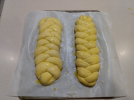- Joined
- Oct 30, 2020
- Messages
- 6
- Reaction score
- 2
Hello everyone, I'm daddytroopa ... new here, bread making is my new COVID19 hobby 
Just wondering what is the purpose of a second proof? Can it be skipped? I feel a lot of steps in baking and any recipe in general is simply tradition and can be skipped.
The challah bread pictured below uses 2 tsp of inst yeast to 2C AP flour (+milk, olive oil, salt). The bread rolls below uses 1/4 tsp inst yeast to 2C AP flour (+water, olive oil, salt), I see no difference when proofing except the challah proofs a lot faster ... is that the only difference in yeast ratio? Proofing speed?
So sourdough is a pain b/c of the starter. I mean I work full time, support my family, kids have activities and sports etc... I'm busy. So I accidentally left my challah bread proofing for 36 hours. I was going to throw it away, but I re-proofed it for another 3 hours after kneading the dough again and I figure I may as well try it. After baking it, the flavour came out a bit sour, like sourdough without starter. Internet / YT search for "no starter sourdough" yields virtually no results. I'm wondering if this is possible... thoughts on this?


Just wondering what is the purpose of a second proof? Can it be skipped? I feel a lot of steps in baking and any recipe in general is simply tradition and can be skipped.
The challah bread pictured below uses 2 tsp of inst yeast to 2C AP flour (+milk, olive oil, salt). The bread rolls below uses 1/4 tsp inst yeast to 2C AP flour (+water, olive oil, salt), I see no difference when proofing except the challah proofs a lot faster ... is that the only difference in yeast ratio? Proofing speed?
So sourdough is a pain b/c of the starter. I mean I work full time, support my family, kids have activities and sports etc... I'm busy. So I accidentally left my challah bread proofing for 36 hours. I was going to throw it away, but I re-proofed it for another 3 hours after kneading the dough again and I figure I may as well try it. After baking it, the flavour came out a bit sour, like sourdough without starter. Internet / YT search for "no starter sourdough" yields virtually no results. I'm wondering if this is possible... thoughts on this?
Attachments
Last edited:

